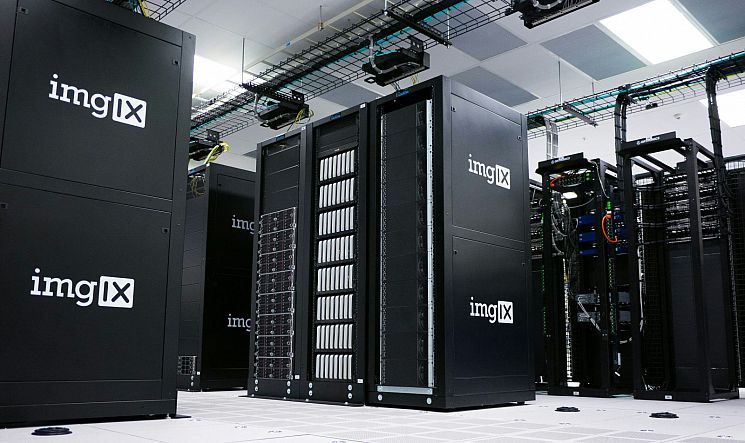Phasing-out Big Oil, Phasing-in Big Tech? The importance of data and AI for the energy transition
With the goals of the Paris Agreement only achievable through a rapid and managed phase-out of fossil fuel production, attention is turning to how to end fossil fuel production in a way that is just and equitable. Usually, these concerns centre on the workers and communities that rely on fossil fuel production for their livelihoods. However, as Silvia Weko of FAU Erlangen-Nuremberg argues, phasing-out fossil fuels could lead to a phasing-in of Big Tech, with a variety of implications for equity, justice, and energy security.

The transition from systems based on fossil fuels to clean energy has the potential to bring enormous change to the global political system and economy. Some observers also see energy systems based on renewables as inherently more equitable than fossil fuel systems because the sun and wind cannot be controlled the same way that oil or gas can be.
But what is often overlooked is the role of data and algorithms in managing how energy resources are used and owned. Increasingly, energy systems rely on this invisible infrastructure as well as substations and power lines. This invisible infrastructure—data and Artificial Intelligence (AI)—rests largely in the hands of Big Tech, which is now making its own forays into energy systems around the world.
Who benefits from energy transitions?
In a recent article, ‘New Sites of Accumulation? Why Intangible Assets Matter for Energy Transitions‘, I argue that economic benefits from energy transitions are not tied to energy resources, but to the power that different actors have over how energy systems are organized and structured. In fossil fuel energy systems, the control of physical energy resources has historically been a source of power, enabling resource ownership to be centralized with owners able to squeeze a large share of value out of other actors.
We should not expect energy resources to be valuable in and of themselves, but rather look at power and control over the assets in question. In renewable energy systems, technological leadership is a source of structural power within energy systems, giving whoever controls flows of data and knowledge the ability to influence how value is distributed.
Big Tech firms like Amazon, Google, and Microsoft are key actors in supporting the digital infrastructure that is needed to gather and analyze data on energy generation and demand, and the algorithms to help manage this complex system through the transition. This affords them an important structural advantage that can enable them to concentrate knowledge and therefore power and value through their access to energy-related data and expertise in artificial intelligence (AI). And as fossil fuel-based energy systems rescind, these companies will play an increasingly integral role in clean energy systems and, by extension, the economies of which they are a part.
The importance of data and AI for clean energy systems
There are fundamental coordination challenges with clean energy systems that necessitate digitalization. First, these systems need to match demand with a variable energy supply, as renewables fluctuate by the minute, hour and season. Second, decarbonizing sectors like transportation and heating requires integration with the electricity grid. Data and AI are therefore needed to coordinate matching variable energy supply with electricity demand, which is larger and more difficult to predict. This is where Big Tech comes in: as a provider of digital infrastructures for other companies; and increasingly as an innovator due to its access to enormous and varied streams of data, and its ability to analyse data using AI, with which very few other firms can compete.

American Public Power Association via Unsplash
Amazon’s entry into clean energy systems tech
The case of Amazon illustrates the importance of data and AI, and the speed with which Big Tech can expand into new sectors through gathering expertise from physical infrastructure, cloud services and partnerships. In terms of its own infrastructure, Amazon’s physical assets, from solar panels to machinery, are connected to the Internet of Things (IoT) and send proprietary data to the cloud, which can then be used for innovation. Amazon has access to information from its on-site renewables, battery storage, electric vehicles (EVs) and their charging infrastructure, and more.
Amazon’s cloud services are also a major way that the company gains access to information. Companies that use Amazon Web Services (AWS) to aggregate and analyse data enable AWS to learn and improve. This can happen directly and with the permission of the company – as is the case for many firms who partner with AWS on data optimization and innovation, such as Siemens. However, it can also happen indirectly when encrypted data is processed with AI because algorithms learn by processing information. In this way, Amazon’s AI capacities improve when its cloud services algorithms interact with business users. As AWS has approximately 1/3 of the global market share of cloud services, it has access to vast amounts of information.
This expertise can then be used for innovation and investment. My research shows that Amazon is investing billions in companies working on alternative transportation, including electric vehicles and self-driving cars, smart home and thermostat technologies, amongst many other technologies. Since 2021, Amazon has also begun investing in energy management companies and electrolyzer manufacturers. AWS also provides grants for cloud services to startups, locking innovators into its data infrastructure.
Taken together, this demonstrates that controlling data and AI enables Big Tech to gain innovative advantages in energy transitions. And as fossil fuel phase-outs become more common place and renewable systems are scaled up to replace them, Big Tech has a huge advantage over other firms because of its existing capacities and infrastructure that help it harvest data from different actors in its networks. While Amazon was the focus of my research, other Big Tech firms appear to be following similar trajectories.
The risk of an unjust energy transition
The increasingly important role that Big Tech firms play in the energy transition comes with potential risks. When it comes to providing digital infrastructure, most companies do not have sufficient capabilities to do this themselves, even those with high technical expertise like Siemens. This is part of a larger pattern where European countries have few choices when it comes to cloud services, as the market is dominated by Google, Amazon and Microsoft (GAM), alongside several Chinese companies. Because of geopolitical concerns around using Chinese data infrastructure, European companies will likely end up relying on GAM.
Given that it is so difficult to change pathways once “locked in” to a digital infrastructure, there is a need to carefully consider our current choices as a society and what these mean for our collective energy future. As many countries, such as the UK, look to ramp up the state-led decarbonization of their electricity generation, the dynamics outlined above may curtail efforts to rebalance power towards the state and generate benefits for local communities. This is to say nothing of the wider links between Big Tech’s entry into other sectors and rising social inequality, poor working conditions, and lower tax revenues.
Taken together, this raises the problem that Big Tech’s involvement in energy transitions can result in benefits flowing towards these firms, rather than smaller companies, local communities, or developing countries. Given the importance of local jobs, scaling up new industries and ensuring the benefits of decarbonization reach as many people as possible to maintain public support for phasing-out fossil fuels as part of a just transition, there is a risk of backlash if these expectations are not fulfilled.
-
Silvia Weko is a postdoctoral researcher at the FAU Erlangen-Nuremberg. She completed her PhD at the University of Erfurt in 2023, for which she was awarded second place in the Social Sciences section of the Deutsche Studienpreis, a competition for the best dissertations in Germany. Silvia researches the international political economy of sustainability, with a particular focus on energy.